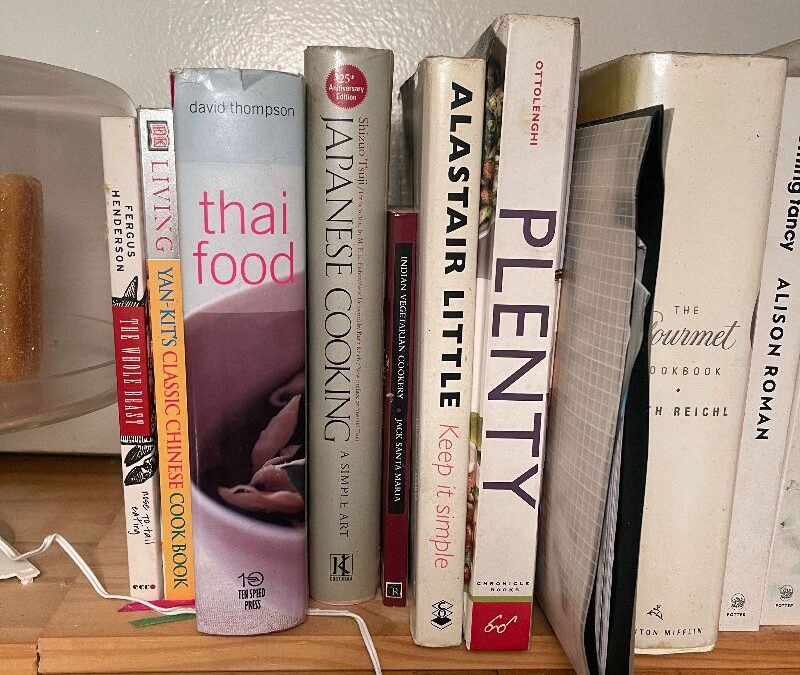Great cookbooks tell you exactly how to make something exquisite. There’s no other written medium that is able to impact a person with such directness. I call that first bite the thunderclap effect. You eat a piece of somebody else’s wisdom and you’re able to share their experience as if it were your own. These moments travel across time and geography and bring you into other worlds. It’s remarkable and I like to celebrate such cookbooks the way some people talk about their kids.
Speaking of kids. Before we had one, I had a pretty expensive cookbook habit. Every week or two I’d find something rare in a local speciality store in San Francisco. It wasn’t unusual for me to spend a hundred dollars on a specific edition of a specific cookbook. It was a deep source of pleasure. We live in New York City now and there’s only room for about 50 cookbooks on a high shelf above a kitchen countertop. Still, I continue to treasure them.
Part of it is nostalgia. My first job out of high school was as a dishwasher in restaurants. Sometimes I’d pretend to be Irish for a laugh. People would call the employment agency and ask for “the Irish kid” again. I enjoyed doing something with my hands. It was the opposite of the expectation for a boy with A-levels as good as mine. It felt like I was getting away with something naughty. Like living in an underworld.
I got a certificate in food writing from City University in London. During my early days as a finance journalist I also worked as a restaurant critic and recipe writer. I co-authored a guide to restaurants in New Orleans in 2010. I interviewed Tony Bourdain and Fergus Henderson. Marcella Hazan signed my copy of Essentials of Italian Cooking. Food writing was an interest which could have developed into a full-fledged career. If only I hadn’t got so hung up on society’s injustices. Although I did. I found writing about those was more nourishing in other ways. One felt one was getting one’s teeth into something of longer-lasting import.
And yet. They say the personal is political. You might not know how you’re going to vote, but you know how you like your coffee in the morning. You can start there. The more time I spend working on social justice communications, the more I realize food is a key part of society. It reflects our aspirations and most basic needs. It reflects our cultural differences and assimilations. It is about the bargains we make and what we’re willing to swallow. It’s also, often, about the people who farmed it and brought it to our table. My friend Erik wrote a nice meditation on his family’s relationship with Cesar Chavez 10 days ago. I recommend it.
I continue to appreciate the transformational quality of a fantastic recipe. Not every cookbook qualifies as great in this regard. There are too many that sell based only on the author’s name and photo. But there’s a recipe for pureed flageolet beans in one of my cookbooks that’s a case in point. These beans are rare to find in supermarkets in California. Living there a few years ago, my wife and I had to drive several miles out of the Bay to find them. You soak them overnight, then you cook them in a pot with some rosemary sprigs and a piece of bacon. There’s a “brunoise” of carrot, celery, onion and four garlic cloves that goes into the pot first. After two hours of cooking on a very low heat, these beans turn into something outlandish. The cookbook author, Alastair Little, was able to convey this magic in fewer than 300 words. Cook them with a rack of lamb, he wrote. It’s “French.”
We had a friend round. He’s since ghosted the pair of us, which is rather sad. Although in some ways his flaking makes the story so Californian. But we ate this lamb on these beans in the springtime and it was like being. Struck. By. Lightning. Food critics always talk about restaurant food being “transformational.” They use such superlatives. But these flageolet beans, man. I’m telling you. They were f___ing outrageous. Words only get about halfway towards describing what they were like. And you can share that kind of thing by passing along a recipe. What a power there is in such words on a page. And that’s why I love great cookbooks.
Have you had a similar experience, preparing a great recipe? Would you care to share it?


